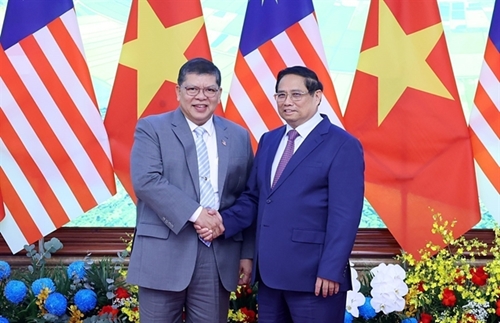PM Chinh suggested Vietnam and Malaysia strengthen political trust by enhancing high-level exchanges across all channels, strive to lift bilateral trade to 18 billion USD in a balanced manner, and facilitate imports and exports of their key goods. It is necessary to encourage Vietnamese businesses to expand investment in Malaysia and vice versa, he noted, adding that Vietnamese and Malaysian companies should also engage deeper in supply chains, digital transformation, and sustainable business, particularly regarding new fields like digital and green economy and energy transition.
    |
 |
|
Prime Minister Pham Minh Chinh (right) meets Speaker of the House of Representatives of Malaysia Tan Sri Dato' Johari Bin Abdul. |
The Government leader also called for Malaysia’s support in helping Vietnam develop its Halal industry and expedite the signing of a bilateral agreement in this area. He also asked the Malaysian side to assist Vietnam in addressing the European Union's yellow card warning imposed on its fishery sector and to continue effective coordination in the humane treatment and repatriation of Vietnamese fishermen detained in Malaysia.
Both sides agreed to deepen collaboration in the fields of defense, security, education, culture, sports, tourism, and people-to-people exchanges.
Speaker Johari affirmed that Malaysia is committed to reinforcing the strategic partnership and fully tapping the substantial cooperation potential between the two nations.
Highlighting Malaysia’s role as ASEAN/AIPA Chair in 2025, Johari showed his hope that Malaysia, Vietnam, and other member states will leverage the strength of their own and of the nearly-680-million-strong ASEAN Community in fostering the bloc’s prosperity, solidarity, and self-reliance, centrality.
PM Chinh assured that Vietnam would support Malaysia in its role as ASEAN Chair next year.
The two leaders concurred that both countries will work closely together and with other member nations to build a united ASEAN, strengthen intra-regional cooperation, and promote the bloc’s centrality on regional issues.
They agreed to continue maintaining ASEAN’s common stance on the East Sea issues, and coordinating for the strict implementation of the Declaration on the Conduct of Parties (DOC) in the East Sea and the negotiations on a practical, effective Code of Conduct (COC) in the East Sea in line with international law, including the 1982 United Nations Convention on the Law of the Sea (UNCLOS).
Source: VNA